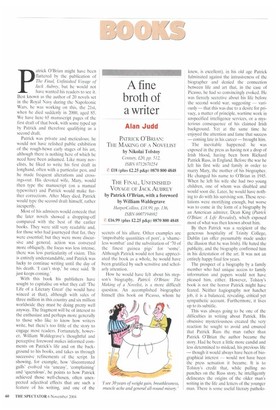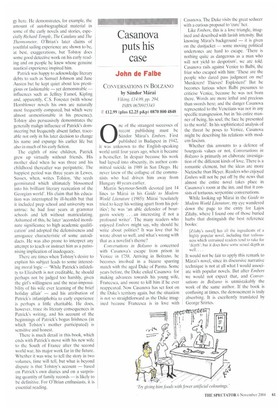A fine broth of a writer
Alan Judd
PATRICK O'BRIAN: THE MAKING OF A NOVELIST by Nikolai Tolstoy Century, £20, pp. 512, ISBN 0712670254 rt £18 (plus £2.25 p&p) 0870 800 4848 THE FINAL, UNFINISHED VOYAGE OF JACK AUBREY by Patrick O'Brian, with a foreword by William Waldegrave HarperColhns, £18.99, pp. 136, ISBN 0007194692 I) £16.99 (plus £2.25 p&p) 0870 800 4848 patrick O'Brian might have been flattered by the publication of The Final, Unfinished Voyage of Jack Aubrey, but he would not have wanted his readers to see it. Best known as the author of 20 novels set in the Royal Navy during the Napoleonic Wars, he was working on this, the 21st, when he died suddenly in 2000, aged 85. We have here 65 manuscript pages of the first draft of that book, with some typed up by Patrick and therefore qualifying as a second draft.
Patrick was private and meticulous; he would not have relished public exhibition of the rough-hewn early stages of his art, although there is nothing here of which he need have been ashamed. Like many novelists, he liked to write his first draft in longhand, often with a particular pen, and he made frequent alterations and crossings-out. His devoted wife, Mary, would then type the manuscript (on a manual typewriter) and Patrick would make further corrections. After Mary died, Patrick would type the second draft himself, rather inexpertly.
Most of his admirers would concede that the later novels showed a dropping-off compared with the best of the earlier books. They were still very readable and, for those who had journeyed that far, they were essential; but they were more discursive and general, action was conveyed more obliquely, the focus was less intense, there was less particularity of vision. This is entirely understandable, and Patrick was lucky to continue writing until the day of his death. `I can't stop,' he once said. 'It just keeps coming.'
With this book his publishers have sought to capitalise on what they call 'The Life of a Literary Great' (he would have winced at that), although with sales of three million in this country and six million worldwide they must be doing pretty well anyway. The fragment will be of interest to the enthusiast and perhaps more generally to those who like to know how writers write, but there's too little of the story to engage most readers. Fortunately, however, William Waldegrave's thoughtful and perceptive foreword makes informed comments on Patrick's life and on the background to his books, and takes us through successive refinements of the script. In showing, for example, how 'discontented gulls' evolved via 'uneasy', 'complaining' and 'querulous', he points to how Patrick achieved those well-chosen, often unexpected adjectival effects that are such a feature of his writing, and one of the secrets of his allure. Other examples are improbable quantities of port', a 'shameless wombat' and the substitution of '70 of the finest guinea pigs' for 'some'. Although Patrick would not have appreciated the book as a whole, he would have been gratified by such sensitive and scholarly attention.
How he would have felt about his stepson's biography, Patrick O'Brian: The Making of a Novelist, is a more difficult question. An accomplished biographer himself (his book on Picasso, whom he
knew, is excellent), in his old age Patrick fulminated against the intrusiveness of the biographer and denied the connection between life and art that, in the case of Picasso, he had so convincingly evoked. He was fiercely secretive about his life before the second world war, suggesting — variously — that this was due to a desire for privacy, a matter of principle, wartime work in unspecified intelligence services, or a mysterious consequence of his claimed Irish background. Yet at the same time he enjoyed the attention and fame that success —coming late in his career — brought him.
The inevitable happened: he was exposed in the press as having not a drop of Irish blood, having been born Richard Patrick Russ, in England. Before the war he left his first wife and family in order to marry Mary, the mother of his biographer. He changed his name to O'Brian in 1945. When he left his wife she had two young children, one of whom was disabled and would soon die. Later, he would have nothing to do with his surviving son. These revelations were mortifying enough, but worse was to come in the form of a biography by an American admirer, Dean King (Patrick O'Brian: A Life Revealed), which exposed most of what was then known about him.
By then Patrick was a recipient of the generous hospitality of Trinity College, Dublin (an offer presumably made under the illusion that he was Irish). He hated the publicity, and the biography confirmed him in his detestation of the art. It was not an entirely happy final few years.
The prospect of a biography by a family member who had unique access to family information and papers would not have pleased him, either. However, Tolstoy's hook is not the horror Patrick might have feared. Neither hagiography nor hatchet job, it is a balanced, revealing, critical yet sympathetic account. Furthermore, it lives up to its subtitle.
This was always going to be one of the difficulties in writing about Patrick. His obsessive mysteriousness created the very reaction he sought to avoid and ensured that Patrick Russ the man rather than Patrick O'Brian the author became the story. Had he been a little more candid and less determined to mislead, his previous life — though it would always have been of biographical interest — would not have been the press sensation it became. It is to Tolstoy's credit that, while pulling no punches on the Russ story, he intelligently delineates the origins of the older man's writing in the life and letters of the younger man. There is some useful literary patholo gv, here. He demonstrates, for example, the amount of autobiographical material in some of the early novels and stories, especially Richard Temple, The Catalans and The Thermometer. O'Brian's later claims of youthful sailing experience are shown to be, at best, exaggerations, but Tolstoy does some good detective work on his early reading and on people he knew whose genuine nautical experience inspired him.
Patrick was happy to acknowledge literary debts to such as Samuel Johnson and Jane Austen but he kept quiet about less prestigious or fashionable — yet demonstrable — influences such as Jeffrey Farnol, Kipling and, apparently, C. S. Forester (with whose Hornblower novels his own are naturally most frequently compared, but which were almost unmentionable in his presence). Tolstoy also persuasively demonstrates the generally malign influence of Patrick's domineering but frequently absent father, traceable not only in his later decision to change his name and expunge his earlier life but also in much of his early fiction.
The eighth of nine children, Patrick grew up virtually without friends. His mother died when he was three and his childhood thereafter was peripatetic. The happiest period was three years in Lewes, Sussex, when, writes Tolstoy, 'the seeds germinated which ultimately blossomed into his brilliant literary recreation of the Georgian world'. His claim that his education was interrupted by ill-health but that it included prep school and university was untrue: he had four years at grammar schools and left without matriculating. Ashamed of this, he later 'accorded inordinate significance to high academic qualification' and adopted the defensiveness and arrogance characteristic of some autodidacts. He was also prone to interpret any attempt to teach or instruct him as a patronising implication of inadequacy.
There are times when Tolstoy's desire to explain his subject leads to some interesting moral logic — 'While Patrick's infidelity to Elizabeth is not creditable, he should perhaps not be judged too harshly, given the girl's willingness and the near-impossibility of his wife ever learning of the brief holiday affair' — and his attribution of Patrick's infantiphobia to early experience is perhaps a little charitable. He does, however, trace its literary consequences in Patrick's writing, and his account of the beginnings of Patrick's bogus Irishness (in which Tolstoy's mother participated) is sensitive and honest.
There is much detail in this book, which ends with Patrick's move with his new wife to the South of France after the second world war, his major work far in the future. Whether it was wise to tell the story in two volumes, time will tell, but what is beyond dispute is that Tolstoy's account — based on Patrick's own diaries and on a surprising quantity of family records — is likely to be definitive. For O'Brian enthusiasts, it is essential reading.



























































































































 Previous page
Previous page